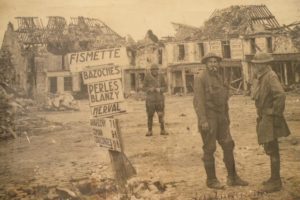 A series profiling American Jewish service in the First World War
A series profiling American Jewish service in the First World War
Benjamin Prager
Veteran and Hero of Fismette
Benjamin Prager was born in Pittsburgh, the son of German immigrants. By the time of World War I, Prager was already a decorated veteran. He’d first volunteered for the Army in 1898 with the 14th Pennsylvania Volunteer Infantry during the Spanish-American War. Prager saw significant action in the Philippine-American War with the 19th Infantry. General Robert Hughes officially cited Prager for bravery in 1900. He was eventually awarded a Silver Star for gallantry in action in Sibalom. Prager spent more time fighting on the Mexican Border in 1916.
When the U.S. entered World War I, Prager was 1st Sergeant with Company E, 111th Infantry, 28th Division. In August of 1918, under orders from French Maj. Gen. Jean Degoutte, the Americans were attempting to capture Fismes and Fismette, France, two towns on opposite banks of the Vesle River. After a brutal two days of battle, the 32nd Division had been decimated. The Pennsylvanians of the 28th Division came to relieve them.
The fighting continued to be ferociously violent. The Germans were attacking with shells, machine guns, and gas. Smoke was everywhere. The Americans had to cross through ravines that had become pockets of gas. Another soldier from Pittsburgh, Captain Robert Pollock, described the fighting this way: “If I am shipped to hell, I think I can stand what the devil had for me, after going through what the Germans had for us in Fismette. They used everything they had on us, from liquid fire down, and many of my best friends were killed or wounded there.”

On August 10th, the 111th occupied the town of Fismette, but the town was still surrounded by heavily-armed Germans unwilling to cede the territory. The next day, Prager was leading Company E just outside of town under heavy fire. Machine gun fire was coming from multiple directions and the orders were to clear out all machine gun nests. Prager and his men entered a house where the rifleman could attempt to pick off the German machine gunners.
The riflemen of Company E were having difficulty identifying where the machine gun fire was coming from. Prager had a solution. Give the Germans a clear target. He stood in the window of the house providing the Germans something to shoot at. It worked. Fire came at Prager and his riflemen were able to identify where the it had come from. They were able to pick off the German machine gun operators.
Clearly, Prager’s strategy meant endangering himself. Indeed, he was wounded. Even so, Prager wasn’t ready to leave the battlefield yet. He wrapped his own wounds and then checked to make sure the other men in his company were properly positioned as combat continued. He was eventually evacuated to the hospital.
Prager was awarded the Distinguished Service Cross with the following citation.
The President of the United States of America, authorized by Act of Congress, July 9, 1918, takes pleasure in presenting the Distinguished Service Cross to Sergeant Benjamin Prager (ASN: 1244151), United States Army, for extraordinary heroism in action while serving with Company E, 111th Infantry Regiment, 28th Division, A.E.F., near Fismes, France, 11 August 1918. On his own initiative and under heavy fire, Sergeant Prager led an automatic-rifle squad to a house far in advance of our lines, and, by purposely exposing himself at a window, drew fire from an enemy machine-gun, thus disclosing its position and enabling his squad to destroy it. After being wounded he refused to be evacuated until he had visited another portion of the line and assured himself that the position was well consolidated.
Prager recovered from his wounds for two months before returning to Company E. The war ended shortly after. In May 1919, Prager was discharged. He returned to Pittsburgh and operated Wm. Prager Safes and Signs. He eventually became an employee of the court system. Prager died August 16, 1858 and is buried at West View Cemetery.